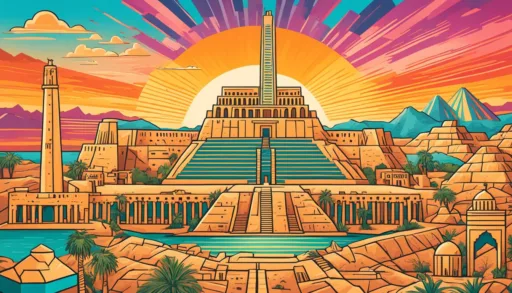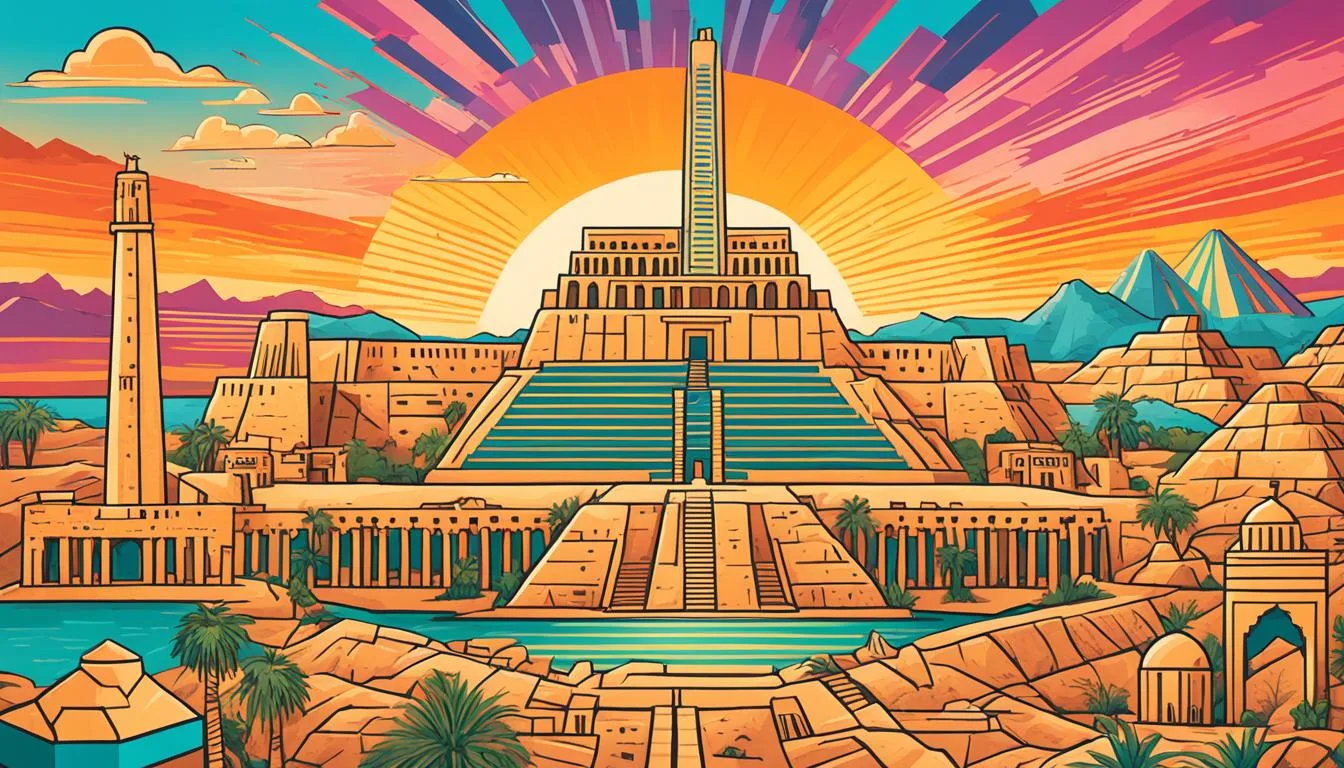Have you ever wondered what the best time to visit Iraq is to fully immerse yourself in its storied past and vibrant culture? The answer might not be as straightforward as you think. Iraq, a country often mentioned in the context of ancient histories and cultural triumphs, presents a unique challenge and opportunity when it comes to identifying the optimal timing for your Iraq trip. Whether you seek to tread the land that bore witness to the dawn of civilization or to celebrate its rich heritage through festivals, understanding the Iraq travel season is crucial for an enriching journey. Let’s embark on a quest to discover when the doors of exploration swing wide open in this cradle of civilization.
Key Takeaways
- Identify the prime months for an optimal travel experience in Iraq.
- Learn about Iraq’s climate and how it influences traveling plans.
- Discover the periods that showcase Iraq’s traditional festivals and cultural events.
- Examine the historical significance of visiting Iraq during culturally relevant seasons.
- Understand the balance of weather comfort and cultural enrichment in planning your visit.
Unveiling the Rich Tapestry of Iraqi Heritage
The cradle of civilization, Mesopotamia, is home to narratives of human progress and innovation. Its storied past is a beacon of academic prosperity that shaped the modern world. Within its scope lies the enduring legacy of the ancient Sumerians, whose contributions to society echo through the annals of history. The cultural heritage of Iraq continues to unveil its secrets, encapsulating the potency of human ingenuity and resilience.
The Resilience of Ancient Mesopotamia
In the vast timeline of human history, the indelible mark of Mesopotamia shines prominently. This land between the Tigris and Euphrates rivers fostered civilizations that pioneered many of what are considered today’s foundational societal structures, from legal codes to scientific principles. The resilience of Mesopotamia is palpable not just in the relics and ruins, but also in the lingering cultural influences that persist in modern-day Iraq.
The Sumerians: Founders of Civilization
The significance of Sumerians in crafting the tapestry of human civilization is monumental. Their inventive spirit gave rise to the earliest form of writing—cuneiform, which in turn, chronicled their advances in mathematics, astronomy, and law. The archaeological site of Girsu, a testament to Sumerian ingenuity, has recently revealed its treasures to the world, including a regal palace and invaluable tablets etched with cuneiform script. These discoveries reinforce the foundational role of the Sumerians in shaping the cultural heritage of Iraq.
Embracing Post-Islamic Cultural Flourish
Following the epoch of ancient civilizations, Iraq continued to develop its unique cultural heritage. The Post-Islamic period saw a multitude of advancements in the arts and sciences within the region. As dynasties rose and fell, the Islamic Golden Age birthed significant intellectual and architectural innovations. Today, remnants of these epochs stand proudly, continuing to tell the story of Iraq’s multifaceted cultural identity.
An Archaeologist’s Playground: Mesopotamia’s Hidden Gems
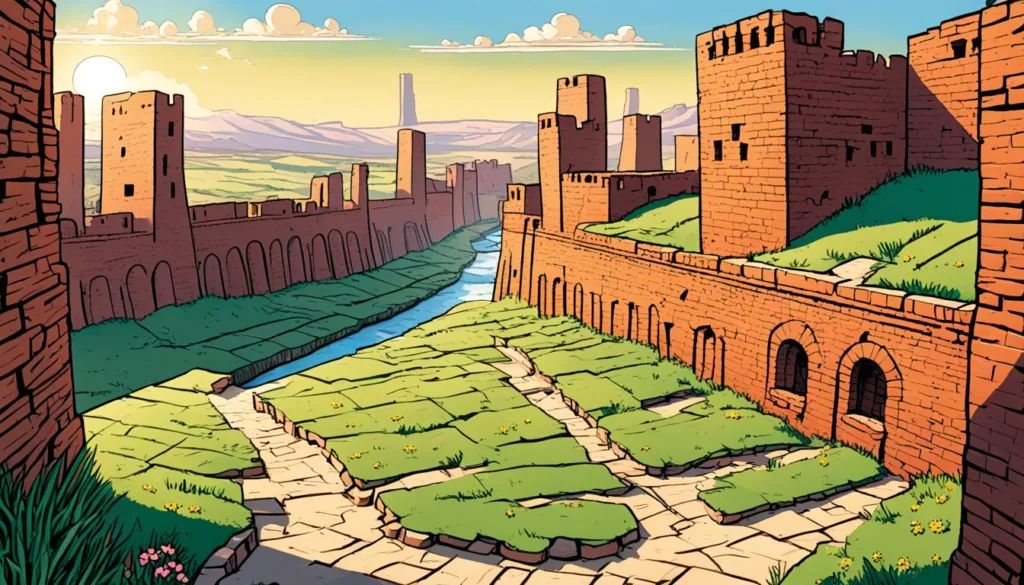
The call of Iraq exploration reverberates through the annals of history, reaching those spellbound by the allure of ancient Mesopotamia and its chronicle of human civilization. This region, teeming with some of the most significant historical sites in Iraq, is an archaeological treasure trove awaiting discovery.
Prime Destinations for Historical Insight
- The Erbil Citadel, a fortress vividly encapsulating centuries of human habitation.
- The Holy Shrine of Imam Hussain, echoing with tales of faith and devotion.
- The Ziggurat of UR, where stairs to the heavens speak of humanity’s celestial aspirations.
Each of these historical sites serves as a testament to diverse ancient cultures, representing a mosaic of influences that carved the Mesopotamian landscape.
| Historical Site | Estimated Date | Civilization | Significance |
|---|---|---|---|
| Erbil Citadel | 5000 BCE | Assyrian to Ottoman | One of the oldest continuously inhabited sites |
| Holy Shrine of Imam Hussain | 680 CE | Islamic | Site of major religious significance |
| Ziggurat of UR | 2100 BCE | Sumerian | One of the best preserved ziggurats in Mesopotamia |
In this archaeological haven, the ancient worlds continue to unfold before eager eyes, and the remnants of civilizations whisper secrets long concealed beneath the sands. Delving into these historical sites not only ignites a passion for the mysteries of the past but also enriches our understanding of humanity’s relentless quest for meaning and mastery over its surroundings.
Artistic Expressions through the Ages in Iraq
The enduring legacy of Iraqi art stands as a testament to the rich cultural history of the region. From the ancient works of Mesopotamian sculpture that have survived millennia, to the intricate beauty of Abbasid calligraphy, Iraqi art has evolved and influenced artistic trends far beyond its geographical borders.
Mesopotamian sculptures are not only archaeological treasures but also artistic masterpieces that shed light on the civilization that once flourished along the Tigris and Euphrates rivers. These works often display remarkable craftsmanship and detail, offering a glimpse into the values and beliefs of societies long gone. Visitors and art enthusiasts marvel at the statutes reflecting the strength of kings and deities, found within Iraq’s ancient ruins and museums.
Iraq is the repository of countless treasures that speak of human creativity. We see this in every terracotta figure and every scroll of calligraphy that has withstood the sands of time.
- The Abbasid era, particularly under the reign of Harun al-Rashid and his successors, was marked by significant advancements in the arts, sciences, and philosophy.
- Calligraphy flourished during this period, with artisans like Yahya Al-Wasiti gaining prominence through their detailed works.
- The book of Maqamat is among the most respected historical pieces, showcasing the leaps in narrative illustration and manuscript production.
This tradition continues to inspire modern-day Iraqi artists, who often draw upon their ancestral heritage to create art that speaks to both the past and present. Further, the cross-generational influence of these art forms has created a unique Iraqi aesthetic discernible in contemporary practices.
In chronicling this vibrant history, we continue to discover the depth of Iraq’s contribution to global art heritage. While the country faces its share of challenges today, the artistic legacy of its past serves as a beacon of inspiration and resilience for its people and for the wider world.
Best Time to Visit Iraq
When considering when to visit Iraq, several factors come into play to ensure the prime time for visiting Iraq. Weather patterns often dictate the top time to explore Iraq, with a preferred window stretching from the cool reprieve of autumn to the welcoming breezes of early spring.
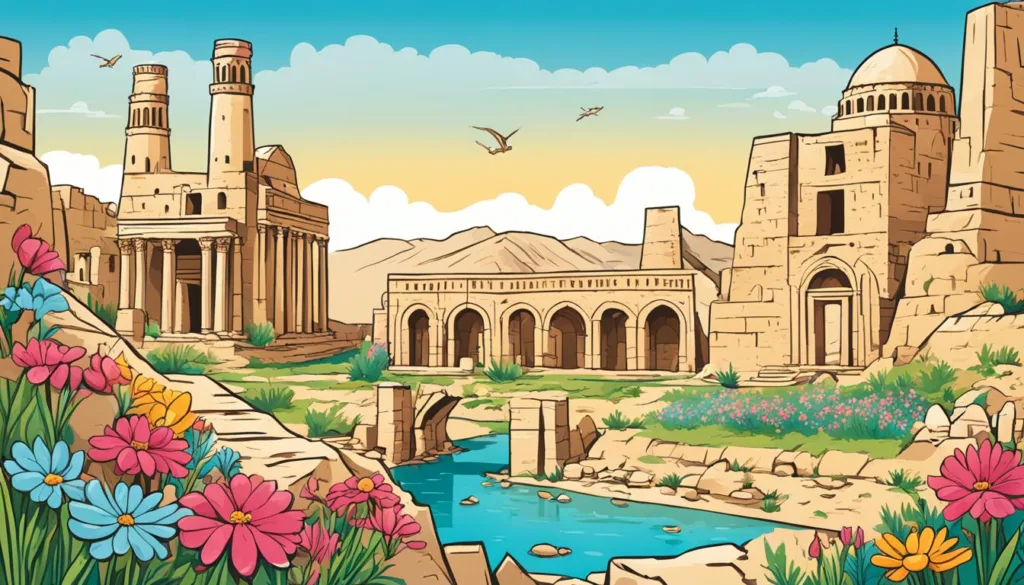
Weather Patterns and Seasonal Highlights
For those contemplating a journey to Iraq, autumn through to spring provides the most favorable conditions. The weather from October to April typically offers comfortable temperatures and clearer skies, which aptly accommodates outdoor explorations and prolonged visits to historical sites. This translates to a period where the ancient splendors of Iraq can be enjoyed to their fullest without the deterrent of extreme weather.
Festivals and Cultural Events
Aligning your visit with the cultural calendar of Iraq can significantly enhance your travel experience. These months not only boast mild weather but also coincide with several festivals and cultural events that showcase the rich traditions and vibrant history of the country. By timing your trip during these celebratory occasions, travelers can immerse themselves in the unique and enriching ambiance that these events offer.
- Baghdad International Film Festival: Witness the city’s burgeoning film scene and international partnerships.
- Babylon Festival: Experience arts and performance amidst the backdrop of ancient history.
- Iraqi Maqam Festival: Delight in the melodies of traditional Iraqi music.
Diving into the Literary Depths of Iraq’s History
The ancient Sumerians not only pioneered urban civilization but also laid the bedrock for Sumerian literature, a cornerstone in the edifice of human culture. Their narrative prowess is best encapsulated in the timeless Epic of Gilgamesh, an opus that stands tall in the panorama of Iraqi literature. This literary masterpiece not only offers a glimpse into the spiritual beliefs and heroics of the period but also reflects the socio-political ethos of the era.
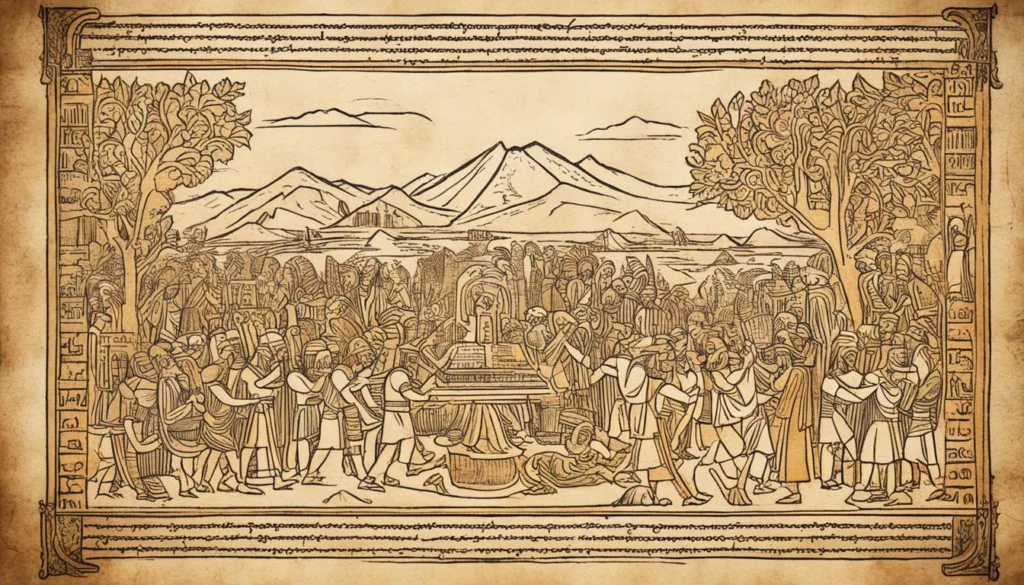
As we venture through the chapters of the world’s earliest known literature, we encounter both mythical lore and factual accounts inscribed on clay tablets, testifying to the Sumerians’ advanced literacy and profound intellectual curiosity. These narratives offer pivotal insight into the sophistication of ancient Iraqi society, drawing us back in time to the cradle of literature.
Known as one of the earliest surviving works of literature, the Epic of Gilgamesh tells a tale of heroism, friendship, and the pursuit of immortality, capturing the essence of human striving and transcendence.
The following table illustrates some of the central themes found within the rich tapestry of Sumerian and Iraqi literature:
| Theme | Representation in Sumerian Literature | Illustration in Epic of Gilgamesh |
|---|---|---|
| Mythology and Religion | Deification of natural phenomena and stories of divine intervention | References to gods like Anu and Enlil, and the divine origins of Gilgamesh |
| Heroism | Tales of historical figures embellished with heroics | Gilgamesh’s journey, his battle with Humbaba, and the Bull of Heaven |
| Mortality | Reflections on life’s impermanence and the afterlife | Gilgamesh’s encounter with Utnapishtim and the search for everlasting life |
| Friendship | Stories showcasing the power of camaraderie | The profound bond between Gilgamesh and Enkidu |
In essence, the rich legacy of Iraqi literature, with its roots deep in the fertile soils of Sumerian creativity, continues to be a beacon of cultural magnificence and a pivotal subject of study for those who delight in the literary arts.
Conclusion
Embarking on a journey to Iraq offers the modern adventurer an exceptional blend of history, culture, and natural beauty. Undoubtedly, answering the question of when is the best time to go to Iraq leans heavily on the country’s seasonal climate and personal preferences. The rhythm of life in this ancient land, rich with the earliest known civilizations’ stories, beacons with its enduring allure. As such, the peak season in Iraq harmonizes with more temperate weather and abuzz with cultural festivities, laying out a carpet of welcome to its visitors.
Travel Tips for the Inquisitive Explorer
For the inquisitive explorer looking to unravel the tapestries of ancient narratives, the ideal time to travel to Iraq falls between October and April. Cooler climes create the perfect backdrop for delving into the nation’s storied ruins and partaking in local traditions. Immersing oneself in the fabric of this storied region demands thoughtful preparation, an openness to new experiences, and a respect for the land’s historical depth and contemporary dynamics.
Why Iraq’s Timeless Allure Beckons
As the land that witnessed the dawn of human civilization, Iraq’s timeless appeal is bound to captivate the hearts of those who tread its soil. Whether one is drawn by the echoes of ancient Mesopotamia or the vibrant pulses of its living heritage, the experience is poised to be both profound and transformative. Recognize that in this cradle of history, every step through its cities and deserts is a walk through time itself, invigorating the soul with a sense of connection to our collective past.
FAQ
What is considered the best time to visit Iraq for historical and cultural exploration?
The optimal timing for an Iraq trip that aligns with pleasant weather and cultural events is typically from October to April. This Iraq travel season offers milder temperatures, which is ideal for visiting historical sites and participating in cultural observances.
How do the ancient civilizations like Mesopotamia and the Sumerians influence the cultural heritage of Iraq?
Mesopotamia and the Sumerians are pivotal to the cultural heritage of Iraq. These ancient civilizations laid the foundations for many aspects of modern society. Sites and artifacts from this era provide invaluable insights into the resilience and contributions of these early populations to the world.
What historical sites in Iraq are must-sees for archaeology enthusiasts?
Iraq is brimming with historical sites that are quintessential for archaeology aficionados. These include the Erbil Citadel, the Holy Shrine of Imam Hussain, and the ancient Ziggurat of UR. Each site offers a glimpse into Iraq’s storied past and is an essential part of any Iraq exploration.
How has Iraqi art evolved from ancient to post-Islamic times?
Iraqi art has a rich history that spans from ancient Mesopotamian sculptures to Abbasid calligraphy and beyond. Over time, Iraqi art has embodied the country’s diverse cultural influences, evolving into a unique aesthetic that reflects its multifaceted past.
What are the prime factors to consider when timing a visit to Iraq?
When planning a visit, one should consider the weather patterns and seasonal highlights that dictate the prime time for visiting Iraq. Cooler months from October to April usually provide the best climate conditions. Aligning your visit with festivals and cultural events can also enhance your travel experience.
Why is Sumerian literature important for understanding Iraqi history?
Sumerian literature, including texts like the “Epic of Gilgamesh,” represents the earliest forms of recorded literature and provides a window into the worldviews, myths, and lives of one of humanity’s earliest civilizations. It is crucial for anyone looking to dive into the literary depths of Iraq’s storied past.
What are some travel tips for those exploring Iraq’s rich historical and cultural sites?
Travelers should consider planning their trip during the cooler months for a more comfortable experience. It’s also advisable to stay informed about the current social and political climate, have a flexible itinerary, and be respectful of local customs and traditions to ensure a safe and enriching visit.
When is the peak season in Iraq, and why should travelers consider visiting during this time?
The peak season in Iraq aligns with the cooler weather from October to April. Travelers often consider this the ideal time to travel to Iraq because it is more comfortable for exploration and it coincides with several cultural events, offering a fuller and more immersive experience.
